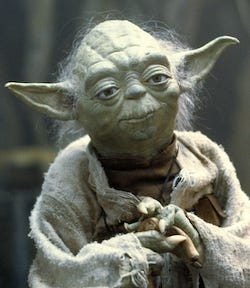Lessons, Carols, and The Last Jedi
Spoilers below for Star Wars: The Last Jedi
My experience of Star Wars has always involved an element of waiting. Born in 1980, the original trilogy was all out before I was really aware of them (I don’t even remember the first time I saw the films). I do remember waiting for the THX on VHS edition as a teenager, and then waiting for the prequels when they were announced. The first came when I was in high school, the second in college, and the third in divinity school. When Disney bought Lucasfilm, I waited again, as trickles of news and later of trailers stoked my sense of anticipation. It’s perhaps fitting, then, that the last three Star Wars films have all come out during Advent, a season of waiting.
The most recent film, apparently the most divisive as well, brought me a different insight into Advent. As my anticipation for the film came to fruition, I was struck also by a central narrative moment in the story. Luke Skywalker, seemingly the titular last Jedi, has been found by the Force-sensitive (and Force-powerful) Rey. Wanting to be left alone to die, racked with guilt for his failures, Luke decides to teach Rey three lessons (largely in a bid to get her off his lawn).
First, he tells her that what she thinks about the Force is wrong. It’s not a power, and it’s not the sole province of the Jedi. It is the connection among living things, among all things, the energy that “surrounds and binds us.” It’s a lesson Luke himself fails the first time with Yoda on Dagobah, but one he shares now with the Rey who wants to rush back into the fight to protect her friends (something a younger Luke also did).
Second, the Jedi were not the heroic legends Rey imagines, but flawed men and women whose pride led to catastrophic failures. He focuses especially on the Jedi at their height (during the prequels) and how they allowed (really, enabled) Darth Sidious/Emperor Palpatine to take over the galaxy. Yet he is also thinking of his own momentary temptations to the Dark Side and how that catalyzed the fall of Ben Solo and the rise of Kylo Ren. Essentially, Luke sees the failure of the Jedi as creating more harm than good, and thus their legacy should end with him. He could well have said “I am a failure, like my father before me.”
Third, well, it is not shown in the movie. Rey and Luke fight, and she departs before he can teach her. A third lesson was filmed (and will presumably be included as a deleted scene on the Blu-ray), but this absence provides for something more narratively effective. Rather than Luke teaching Rey the third lesson, it is Yoda that once again teaches him. The great and tiny master, gratefully a puppet once again, informs Luke that failure is not the end of the story. Rather, failure can be our greatest teacher. Luke, in his stubbornness, missed the opportunity to learn from the mistakes of the past Jedi, and even to learn from his own. In recognizing that, and his failures with both Ben Solo and Rey, he is able to leave his seclusion (in a manner of speaking) and make the kind of self-sacrificial (not self-pitying) act that his first mentor, Obi-Wan Kenobi, made in A New Hope.
These three lessons are not only for Jedi in training, but for all of us waiting this Advent. We do not own the light; we are witnesses to it. The search for control and for power is the very opposite of God’s gift, as Paul reminds us:
Have among yourselves the same attitude that is also yours in Christ Jesus,
Who, though he was in the form of God,
did not regard equality with God something to be grasped.
Rather, he emptied himself,
taking the form of a slave,
coming in human likeness;
and found human in appearance,
he humbled himself,
becoming obedient to death, even death on a cross. (Phil 2:5-8)
Moreover, we fail, regularly, to be true witnesses to the light. “All have sinned and are deprived of the glory of God” (Rom 3:23). We cannot hide that truth from ourselves with heroic auto-hagiographies, nor can we ignore the faults of those we have admired.
Lastly, we ought not to let the truth of our sin lead us to self-imposed exile. Luke’s failure, and more specifically his refusal to seek reconciliation or to learn from his errors, only compounds that failure further. Honesty about our failings can instead lead us to repentance, to trust in the light of Christ to which we are witnesses and which we anticipate this season.
Our hope is not in our own power, and our failures are real but not the whole story. Remembering these lessons can keep our hearts focused on the savior who has come, who is risen, and who will come again.
“Do not be afraid; for behold, I proclaim to you good news of great joy that will be for all the people.
For today in the city of David a savior has been born for you who is Messiah and Lord.
And this will be a sign for you: you will find an infant wrapped in swaddling clothes and lying in a manger.” (Luke 2:10-12)





